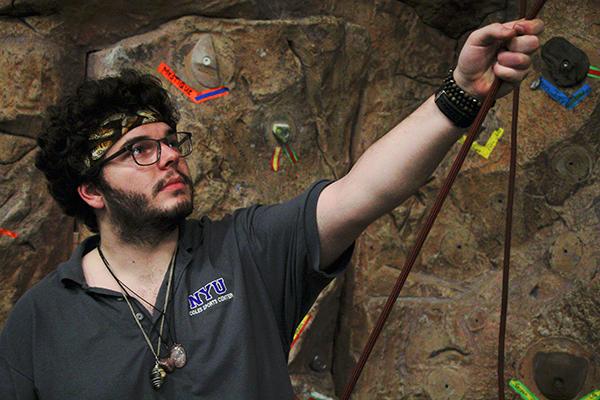What you need to know about work study

Jeremy Eckl at work by the Rock Wall in Palladium Athletic Facility.
November 16, 2015
Living in New York City is expensive. The Federal Work Study Program is one way that students attempt to offset the cost of a pricey education in an even pricier city. A part of the financial aid packages of many NYU students, the work study program allows for flexible on-campus employment with the majority of workers’ wages being paid by the federal government. However, work study does always work perfectly.
For many students in this program, the search for employment began with NYU CareerNet, the Wasserman Center’s job search database. However, students often face competition for jobs and have to deal with unresponsive employers.
During her first semester at NYU, CAS freshman Evy Hall landed a work study position as a coat room attendant in Vanderbilt Hall after turning to CareerNet for job openings. She said finding a job was more difficult than it would seem.
“I saw work study on my financial aid package, so I applied to something like 25 jobs on CareerNet and got lucky,” Hall said. “Most of the people from CareerNet did not respond so you have to be very persistent.”
Competition for jobs on CareerNet can be hard, but fortunately it’s not the only method to get an on-campus position. Gallatin junior Jeremy Eckl, who works as a rock wall attendant at the Palladium Gym, found out about his current job while rock climbing himself and has seen many other people get hired the same way.
“A number of the people I work with were climbers who wanted to join the community,” Eckl said. “I told them they should apply and months later we’re all here together working shifts.”
LS sophomore Leah Balagopal works alongside Eckl at Palladium Gym and enjoys her job, but said it has its disadvantages.
“It’s great to have on the side for some pocket money,” Balagopal said. “But if you really need a job to pay your rent, I would not recommend work study.”
Employees at Palladium are not allowed to do homework on the job, whereas coat room attendants are permitted. This is just one factor to consider when applying for on-campus employment. CAS freshman Matthew Perry, who works in the CAS Advising Office, said the job should pertain to their interests or studies as opposed to only being a way to simply afford a lifestyle.
“What was most important for me was finding a job that helped me outside of the context of my job,” Perry said. “I know a lot of students look for jobs in the departments that they study in and that’s very helpful because it helps you as a student also.”
For many student workers, it is also very important that their jobs respect that they are students first.
“You should look for something that can coexist with your school,” Balagopal said. “School is why you’re here.”
Although every job has its pros and cons, Eckl advised students who are in need of employment not to discriminate. In the end, although there are plenty of jobs on campus, one shouldn’t be so picky.
“It’s a semester or two,” Eckl said. “Look for work, not a career.”
A version of this article appeared in the Monday, Nov. 16 print edition. Email Taylor Nicole Rogers at [email protected].























































































































































